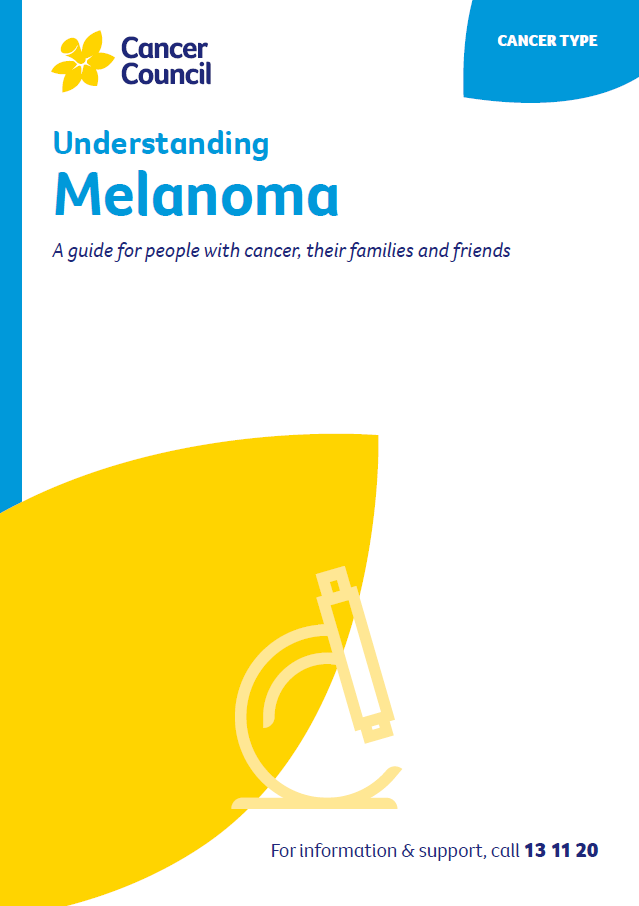Your health care team
Learn how your health care team for melanoma collaborates for effective diagnosis and personalised treatment strategies.
Learn more about:
Overview
You will probably start by seeing your general practitioner (GP). You may see a GP at a general practice, medical centre or skin cancer clinic. Skin cancer clinics are run by GPs with an interest in skin cancer.
If a GP diagnoses or suspects melanoma, they may remove the spot themselves (excision biopsy) or refer you to another doctor, such as a dermatologist or surgeon, for the biopsy. If there’s a waiting list, your GP can ask for an earlier appointment if necessary.
Your GP may arrange further tests. Depending on the nature of the melanoma and their expertise, the GP may recommend ways to treat it, or refer you to a dermatologist or surgeon who will manage your care. In more complex cases, treatment options may be discussed at a multidisciplinary team (MDT) meeting.
Melanoma units
Management and treatment for advanced melanoma can be complex.
People with advanced melanoma – as well as some diagnosed with earlier stage melanoma – can benefit from being treated in a cancer centre that has doctors who specialise in treating advanced melanoma.
Cancer centres are located at hospitals in major cities around Australia. You will be able to see a range of health professionals, called a multidisciplinary team, who specialise in different aspects of your care.
To find a multidisciplinary melanoma unit near you, check with your doctor or call Cancer Council 13 11 20.
Health professionals you may see
| GP | checks skin for suspicious spots, may remove potential skin cancers and refer you to specialists |
| dermatologist | diagnoses, treats and manages skin conditions, including skin cancer |
| general surgeon | performs surgery to remove early melanoma and lymph nodes, and to reconstruct the skin |
| reconstructive (plastic) surgeon | performs surgery that restores, repairs or reconstructs the body’s appearance and function; may also remove lymph nodes |
| surgical oncologist | performs surgery to remove melanoma and conducts more complex surgery on the lymph nodes and other organs; can be a general surgeon or a reconstructive surgeon |
| medical oncologist | treats melanoma with drug therapies such as targeted therapy and immunotherapy |
| radiation oncologist | treats cancer by prescribing and overseeing a course of radiation therapy |
| cancer care coordinator | coordinates care, liaises with MDT and supports you and your family throughout treatment; care may also be coordinated by a clinical nurse consultant (CNC) or clinical nurse specialist (CNS) |
| counsellor, social worker, psychologist | help you manage your emotional response to diagnosis and treatment |
| physiotherapist, occupational therapist | assist with physical and practical issues, including restoring movement and mobility after treatment and recommending aids and equipment |
| palliative care specialist and nurse | work closely with the GP and cancer team to help control symptoms and maintain quality of life |
→ READ MORE: Early melanoma treatment
Podcast: Coping with a Cancer Diagnosis
Listen to more of our podcast for people affected by cancer
More resources
A/Prof Rachel Roberts-Thomson, Medical Oncologist, The Queen Elizabeth Hospital, SA; A/Prof Robyn Saw, Surgical Oncologist, Melanoma Institute Australia, Royal Prince Alfred Hospital and The University of Sydney, NSW; Alison Button-Sloan, Consumer; Dr Marcus Cheng, Radiation Oncologist Registrar, Alfred Health, VIC; Prof Anne Cust, Deputy Director, The Daffodil Centre, The University of Sydney and Cancer Council NSW, Chair, National Skin Cancer Committee, Cancer Council, and faculty member, Melanoma Institute Australia; Prof David Gyorki, Surgical Oncologist, Peter MacCallum Cancer Centre, VIC; Dr Rhonda Harvey, Mohs Surgeon, Dermatologist, Green Square Dermatology, The Skin Hospital, Darlinghurst and Sydney Melanoma Diagnostic Centre, RPA, NSW; David Hoffman, Consumer; A/Prof Jeremy Hudson, Southern Cross University, James Cook University, Chair of Dermatology RACGP, Clinical Director, North Queensland Skin Cancer, QLD; Dr Damien Kee, Medical Oncologist, Austin Health and Peter MacCallum Cancer Centre and Clinical Research Fellow, Walter & Eliza Hall Institute, VIC; Angelica Miller, Melanoma Community Support Nurse, Melanoma Institute Australia, WA; Romy Pham, 13 11 20 Consultant, QLD; A/Prof Sasha Senthi, Radiation Oncologist, Alfred Health, and Clinical Research Fellow, Victorian Cancer Agency, VIC; Dr Chistoph Sinz, Dermatologist, Melanoma Institute Australia, NSW; Dr Amelia Smit, Research Fellow, Melanoma and Skin Cancer, The Daffodil Centre, The University of Sydney and Cancer Council NSW; Nicole Taylor, Clinical Nurse Consultant, Crown Princess Mary Cancer Centre, Westmead Hospital, NSW.
View the Cancer Council NSW editorial policy.
View all publications or call 13 11 20 for free printed copies.

